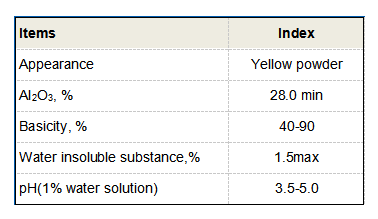flocculant water treatment
The Role of Flocculants in Water Treatment
Water pollution is an escalating global issue, driven by industrial discharges, agricultural runoff, and urban development. As communities strive to provide clean water to their residents, the importance of effective water treatment methods cannot be overstated. One such method that has gained prominence is the use of flocculants. These chemical agents play a crucial role in improving the quality of water by facilitating the removal of suspended solids, thus making water safer for consumption and environmental discharge.
What are Flocculants?
Flocculants are substances that promote the clumping or aggregation of particles in a liquid, resulting in the formation of flocs—larger clusters of particles that can be easily removed from the water. These agents are typically polymers, which can be natural or synthetic, and they function by neutralizing the charges of suspended particles, allowing them to bond together. Common types of flocculants include aluminum sulfate (alum), polyacrylamide, and various biopolymers.
Mechanism of Action
The primary mechanism of flocculation involves destabilizing suspended particles that are normally kept separate due to electrostatic repulsion. When flocculants are added to water, they interact with the particles through charge neutralization and bridging, forming larger aggregates. These flocs are significantly heavier than the individual particles, making them easier to precipitate out of the water column through sedimentation or filtration processes.
This process is often enhanced when combined with coagulation, where coagulants, such as aluminum sulfate, are used to initially destabilize particles before the addition of flocculants. Together, these methods can significantly improve the efficiency of water treatment systems.
Applications of Flocculants in Water Treatment
Flocculants are employed in a wide range of water treatment applications, including
flocculant water treatment

1. Municipal Water Treatment Water treatment plants utilize flocculants to remove impurities and improve water clarity. The addition of flocculants allows for the efficient removal of suspended solids, bacteria, and other contaminants, essential for producing potable water.
2. Industrial Wastewater Treatment Industries such as mining, paper production, and food processing generate large volumes of wastewater containing suspended solids and various pollutants. Utilizing flocculants enables these industries to treat their wastewater effectively, complying with environmental regulations and minimizing treatment costs.
3. Stormwater Management In urban areas, stormwater runoff can carry significant amounts of pollutants, leading to water quality issues in nearby rivers and lakes. Flocculants can be used in stormwater treatment systems to enhance the removal of sediments and toxins, contributing to better overall water quality.
4. Sludge Management In wastewater treatment facilities, flocculants help in sludge thickening and dewatering processes. By promoting the aggregation of finer particles, flocculants allow for the efficient recovery of water from sludge, reducing the volume of waste and improving the economic viability of treatment operations.
Environmental Considerations
Despite the benefits of flocculants, their use must be carefully managed to mitigate potential environmental risks. Some synthetic flocculants may pose toxicity concerns to aquatic life if they leach into water bodies post-treatment. Therefore, it is essential to select flocculants that are environmentally friendly, especially in sensitive ecological areas.
The trend towards using more sustainable and biodegradable flocculants is gaining traction. Researchers are exploring natural alternatives derived from plant materials, which can effectively enhance water treatment while reducing environmental impact.
Conclusion
Flocculants play an indispensable role in modern water treatment processes, significantly improving the quality of water and ensuring its safety for consumption and environmental discharge. Their ability to enhance the removal of suspended solids makes them vital for municipal and industrial applications alike. As the global demand for clean water continues to rise, the optimization and responsible use of flocculants will be critical to achieving sustainable water management solutions for future generations. By balancing effectiveness with environmental responsibility, the water treatment industry can continue to evolve and meet the challenges of water pollution and scarcity.
-
Pbtc Scale InhibitorPBTC: A Scale Protector for Industrial Water TreatmentNewsAug.05,2025
-
Organic Phosphonate: An Efficient Defender in the Field of Scale InhibitionNewsAug.05,2025
-
Hydrolyzed Polymaleic Anhydride: Green Pioneer in Scale Inhibition FieldNewsAug.05,2025
-
PAPEMP Polyamino Polyether Methylene Phosphonic Acid For SaleNewsAug.05,2025
-
Flocculant Water Treatment: A Pioneer in Purification in the Field of Water TreatmentNewsAug.05,2025
-
Benzyl Isothiazolinone: An Efficient and Broad-Spectrum Antibacterial Protective GuardNewsAug.05,2025





